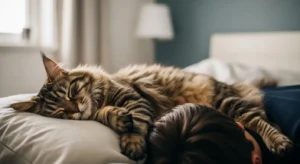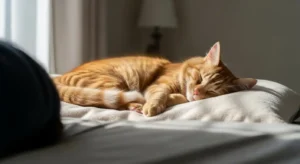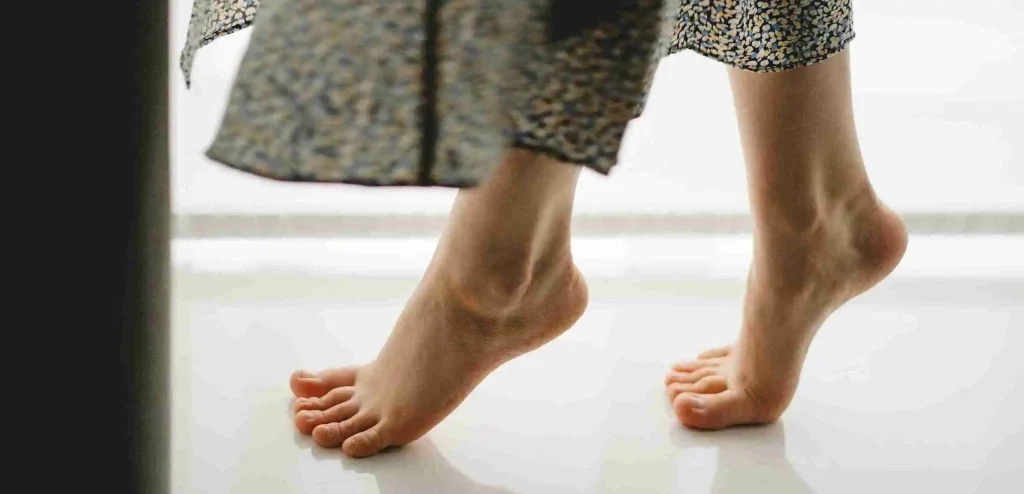When a cat sleeps above your head, it often carries a sacred and symbolic meaning. Across many cultures, this unique behavior is seen as a comforting act of trust, emotional bonding, and spiritual connection.
- When a cat sleeps above your head, it shows deep trust, love, and emotional bonding.
- Many cultures see this behavior as spiritual, symbolizing protection, guidance, and sacred energy.
- Your head’s warmth and scent attract cats, offering them comfort while they share calming energy with you.
- Cats may respond to your crown chakra, bringing balance, healing, or emotional support as you rest.
- This habit blends instinct and intuition, reflecting both love and the cat’s need to feel safe and alert.
- Sleeping near your head may help your cat guard you, creating a peaceful, shared space every night.

This sleeping position shows your cat feels safe and close to you. It reflects a strong bond, built through shared trust and gentle contact.
Cats are known to sense energy shifts. When positioned near your crown, they may be responding to your chakra, offering healing, balance, or emotional comfort.
In India, Greece, and Scotland, cats are believed to bring fortune, protection, and messages from ancestors. Their presence is not random—it’s a spiritual act full of meaning, often tied to intuition and emotional awareness.
Their choice of sleep location reflects more than just warmth or preferences. Cats are drawn to the energy around your head, a place where thoughts, feelings, and vulnerability come together.
Cultures like Turkey, Thailand, and Brazil view cats as magical protectors. In these traditions, a cat near your head acts as a messenger, offering direction, guidance, or even absorbing negative vibes.
Some also believe cats absorb energy during this ritual. Their purrs, stroking, and snuggles create a calming response that supports your emotional well-being and allows for peaceful sleep.
Scientifically, your head gives off scent, heat, and gentle motion during sleep. Cats sense this and find comfort in the steady rhythm, much like they would with a parent or guardian.
In Mexico, Morocco, and China, cats have been seen as symbols of fertility, luck, and sacred wisdom. This behavior can be a quiet message, shared through their presence, movement, and closeness.
Whether they’re marking you with their glands or gently placing their head on yours, it’s part of their behavior rooted in intuition, security, and mutual trust. These moments show how felines often act with discernment and emotional empathy.
This occurrence, while it may seem ordinary, holds layers of interpretations across cultures. From Indonesia to Celtic folklore, it’s cherished as something both magical and emotionally rich.
A cat coming to your house again and again can be a special sign. It may mean the cat feels safe with you and wants to protect you. Some people believe cats carry messages from the universe or the spirit world.
Cat Sleeps on Pillow Above my Head

When a cat sleeps on the pillow above your head, it’s a sweet sign of trust and comfort. This behavior can reflect a strong bond, a love of warmth, and the cat’s instincts for closeness and protection.
Cats often seek elevated, soft places that smell like their favorite human. Your pillow carries your scent, and lying above your head lets them feel safe, while staying close.
This act of sleeping near you shows affection, trust, and a sense of ownership. It’s a cozy form of dominance, where your fuzzy friend claims space while staying your loving companion.
Your cat might be trying to guard you while you sleep. This watchful habit helps them feel in control of their environment, while offering you quiet protection through the night.
The warm feeling of fur near your head brings a flood of comfort and peace. These warm fuzzies aren’t just physical — they bring emotional soothing, making you feel blessed and bonded.
Sleeping so close can show how loyal and attached your cat is. Cats who feel secure often seek this kind of closeness, showing they truly love and choose to be with you.
The position also gives them a clear vantage point to observe the space. By resting up high, they can stay alert and watch for changes while enjoying their headspace.
Some cats will even press gently into your head or curl around it like a hat. Others might try to spoon your face or neck, reinforcing the tight bond you share every night.
They may insist on this nightly ritual and won’t be moved, even if you shift. That’s their way of saying “this is our spot,” and it deepens the relationship you’ve built.
Cats are creatures of habit, and their behavior reflects both instinct and emotion. When they sleep near your head, it creates a shared, trusting environment where both human and cat feel safe, cuddled, and loved.
When a deer crosses your path, it is a peaceful and lucky sign. It means you are being guided by gentle and kind energy. The deer shows love, calm, and strong inner feelings.
Frequently Asked Questions
What does it mean when cats sleep above your head?
When a cat sleeps above your head, it’s a spiritual sign of deep trust and emotional bonding. Your head holds energy and thoughts, and the cat may sense your crown chakra, offering balance and healing. This act is often seen as sacred, showing the cat protects and guides you with loving energy.
Why is my cat sleeping on top of me spiritual meaning?
Sleeping on top of you shows your cat’s strong love and loyalty. Spiritually, it may be guarding your heart or spirit, bringing calm and safety as you rest. Many believe this closeness allows cats to absorb stress and offer comfort from the spirit world.
Why does my cat like to be above my head?
Your cat may love being above your head to stay close to your energy and offer quiet support. In many cultures, this space holds sacred meaning, and cats use it to share peace, wisdom, and guidance. They also enjoy your scent and warmth, creating a safe, healing space for both of you.
Disclaimer
At SpiritualGleam, we explore the deep spiritual and symbolic meanings of life’s many facets. Our insights are based on a blend of ancient wisdom and personal interpretations. Please note that our content is for informational purposes only and should not replace professional advice.





